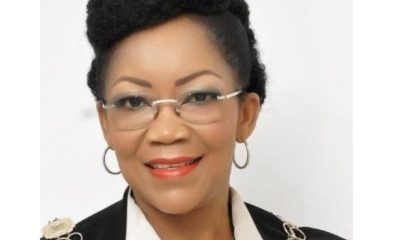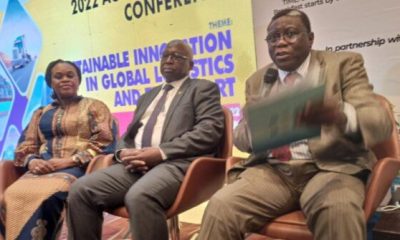Maritime Agencies
CILT 2023 CONFERENCE/AGM: Experts X-ray Hindrances to AfCFTA, Offer Solutions.
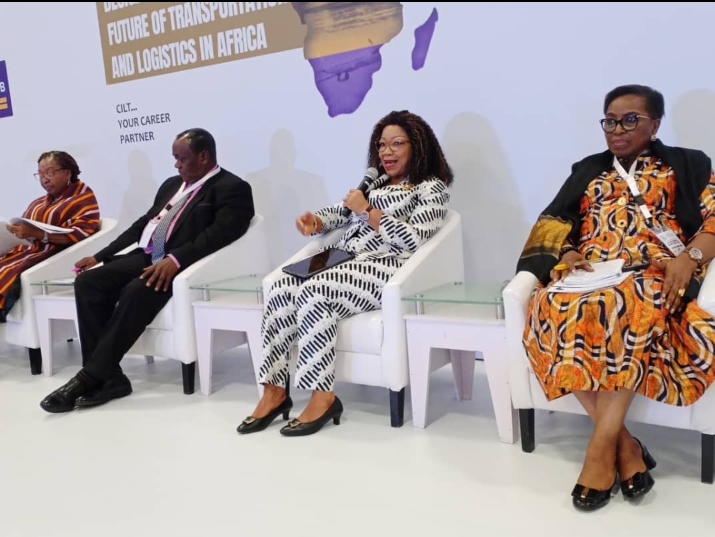
By Izuchukwu Ozoemena
For the umpteenth time, attention is being drawn to the fact that for the African Continental Free Trade Agreement (AfCFTA) to achieve the desired goal of trade and economic integration in Africa, political leaders must demonstrate the political will to address the twin setbacks of insufficient transport infrastructure and unprofessional activities of government agencies at ports, numerous road checkpoints and border stations especially along the West African corridor.
Professor of International Economic Relations at Covenant University, Nigeria, Prof. Jonathan Aremu, stated this in Lagos, Monday, while delivering a
paper entitled “Cross-border Trade and Regional Integration”. He was the lead speaker at the 2023 Conference and Annual General Meeting of the Chartered Institute of Logistics and Transport (CILT).
The conference which was massively attended by experts in logistics and transportation from Nigeria and beyond featured the theme “Designing the Future of Transportation and Logistics in Africa”.
They were unanimous in identifying dilapidated transport infrastructure and an unfriendly business environment as some of the biggest threats AfCFTA is grappling with. Until these are realistically sorted out, they said, the trade regime remains a pipe dream.
Speaking on challenges posed by activities of government officials at ports and land borders, Prof Ngozi Egbuna, former Director-General, West African Monetary Institute (WAMI), Lagos, observed that it is only when Nigerians are exporting non-perishable items that they quickly overlook and accommodate delays arising from poor transport infrastructure and anti-trade posture of agencies of government as exemplified in bribery and corruption. But what happens to goods on transit if they are time-bound and perishable? She featured on the showcase session which dwelt on Cross-border Trade and Regional Integrity.
In a bid to ensure that cross-border trading is simple and seamless, she strongly advised African governments to prioritize the improvement of transportation infrastructure. Access to finance and trade efficiency in the continent must be at par with what obtains in developed economies.
Port operations in Africa must be without encumbrances.
“I remember going to Cairo for an AFREXIM Bank trade fair. As at the time we were leaving Cairo after the event, some goods hadn’t arrived for them to be displayed at the trade fair. Some of those goods were coming from Ghana, Kenya and Addis- Ababa. They didn’t arrive until the end of the trade fair. This is a challenge we have in Africa,” Prof. Ngozi Egbuna regretted.
In her submission, one of the discussants, Chief Mrs Chinwe Ezenwa was particular about the role of Customs, infrastructure and government policies as challenges Nigeria in particular must address.
Ezenwa, former Managing Director of the National Inland Waterways Authority (NIWA) and Chairman, Le Look Nig Ltd, also pinpointed the absence of integration of supply-chain arrangements in AfCFTA’s considerations.
“Business is war; there are enemies on every side. In this AfCFTA, we don’t even know what the integration is all about when it comes to export trade. From manufacturing to supply-chain, customs operations to transport infrastructure, on every side there are challenges. This explains why we have more informal trade across the borders.”
She warned that AfCFTA cannot achieve the ideals it was conceived to address if these problems persist.
“When we produce our goods and ship to Ghana, we find that sometimes the goods are detained at the Customs shed at Ghana. The goods spend about 6 weeks to be cleared in Ghana, even though it was a shop in Ghana that ordered for these goods, ” Ezenwa gave as example.
She described Customs as an enabler in AfCFTA trade. Documentation processes for shipping to Ghana and some other African countries, she observed, are too cumbersome. There must be a workable and effective Return Policy for African exports and goods to be traded under AfCFTA.
In her goodwill message, former Aviation Minister, Dr Mrs Kema Chikwe congratulated CILT Nigeria for always being at the vanguard of championing worthwhile transportation issues. She regretted that Africa cannot confidently claim that she has made commendable progress with the state of transportation infrastructure. She advised governments to be more effective in designing impactful policies to drive African integration. “We can’t make progress if we can’t effectively connect by air,” for instance. Dr. Anthonia Ekpa, former Permanent Secretary, Federal Ministry of Special Duties, re-echoed the role of corruption as earlier stated. She observed that corruption remains a major challenge to regional trade and integration especially in the ECOWAS subregion.
“Traders are encouraged to use the land borders and ports, but Customs, Police and other agencies don’t seem to understand that goods are time-bound. Sometimes goods are seized and forgotten at the warehouses of the security agencies.”
“Regional integration means allowing citizens and goods from one country easily access the other nation. Nigeria flouted this for a long period with the border closure and we know that there were huge socio-economic consequences for nations on both sides of the border,” Ekpa said.
In his intervention, Chairman, Ecomarine Group, Mr. Mahmud Tukur, noted that shipping to several African countries remains more expensive than trading with Europe and Asia where trade barriers are non-existent. He questions why African policy makers have refused to learn a lesson from this.
Speaking through Mr Dayo Balogun, Managing Director, Ecomarine, Tukur suggested that AfCFTA should seriously consider developing what he described as short-sea shipping and regional cabotage to retain monetary benefits of AfCFTA trade.
Dwelling on the logistics environment in Nigeria, the Ecomarine boss remarked that moving a container from China to Lagos ports is seamless and cheaper than doing the same from Lagos to Kano.
Tukur called for massive investments in transportation infrastructure. He stressed the need to dredge and activate eastern ports as soon as possible, expand rail services and roads. and Barge operations must also be encouraged.
In her welcome address earlier, President, CILT Nigeria, Barr. (Mrs.) Mfon Usoro stated that the conference theme was carefully chosen to align with the revitalized push for intra-African trade under the AfCFTA.
“The conference theme and content underscore the crucial role of efficient and sustainable logistics and transport in the attainment of the goals of AfCFTA”, she declared.
“As the world looks to the large market and youthful population in Africa, professional bodies such as ours continue to drive intelligent and incisive conversations intended to produce pragmatic policies and competent implementing organs of government that promotes growth of the private sector in wealth creation so that Nigeria and other African States can evolve into major players in the global economy.”
Declaring the event open, Aviation and Aerospace Development Minister, Festus Keyamo (SAN), remarked that efficient movement of goods and people not only fuels economic growth but is intrinsically tied to the nation’s food security initiatives.
“In the realm of aviation and aerospace development, we are presented with opportunities to redefine the landscape of transportation, fostering economic growth and enhancing our commitment to sustainable development goals. The relevance of our discussions here today extends seamlessly to the 8-point agenda set forth by the President of the Federal Republic of Nigeria, Bola Ahmed Tinubu. In our pursuit of a more prosperous future, the transportation and logistics sector plays a pivotal role in translating vision into reality.”
The Aviation Minister who was represented by his Special Adviser, Henry Agbebire, observed that a well-managed logistics and transport system enhances job creation.
“The aerospace and logistics sectors are dynamic engines of employment, providing opportunities that span a spectrum of skills and expertise, contributing significantly to the overarching goals and aspirations of the government of our nation. By harnessing cutting-edge technologies and strategic partnerships, we can not only optimize logistics but also contribute to a greener and more sustainable future,” he assured.
At the event, the Chairman, 2023 Conference Planning Committee, Prof. Kayode Oyesiku, previewed a 9-chapter entitled “Perspectives on Sustainable Innovations in Global Logistics and Transportation”, a compendium of academic and scholarly presentations by experts and international delegates at the 2022 CILT National Conference.
Transportation gurus such as the CILT International President-elect, Chief Teete Owusu-Nortey, a Ghanaian; CILT International Vice President and Chairman, African Forum, Alhaji Ibrahim Jibril; President, Chartered Institute of Transport Administration (CIoTA) Nigeria, Prince Segun Obayendo and Founder, Women in Logistics and Transport (WiLAT), Hajia Aisha Ali-Ibrahim graced the occasion.
Others included Capt Sunday Umoren, the Secretary-General, Abuja MoU on Port State Control; Founder, ABC Transport Plc, Mr. Frank Nneji; former President, National Association of Government Approved Freight Forwarders (NAGAFF), Chief Eugene Nweke, among other logistics eggheads.
Maritime Agencies
MARAN Hosts Discussion on Nigeria-China Currency Swap Deal: Opportunities, Challenges
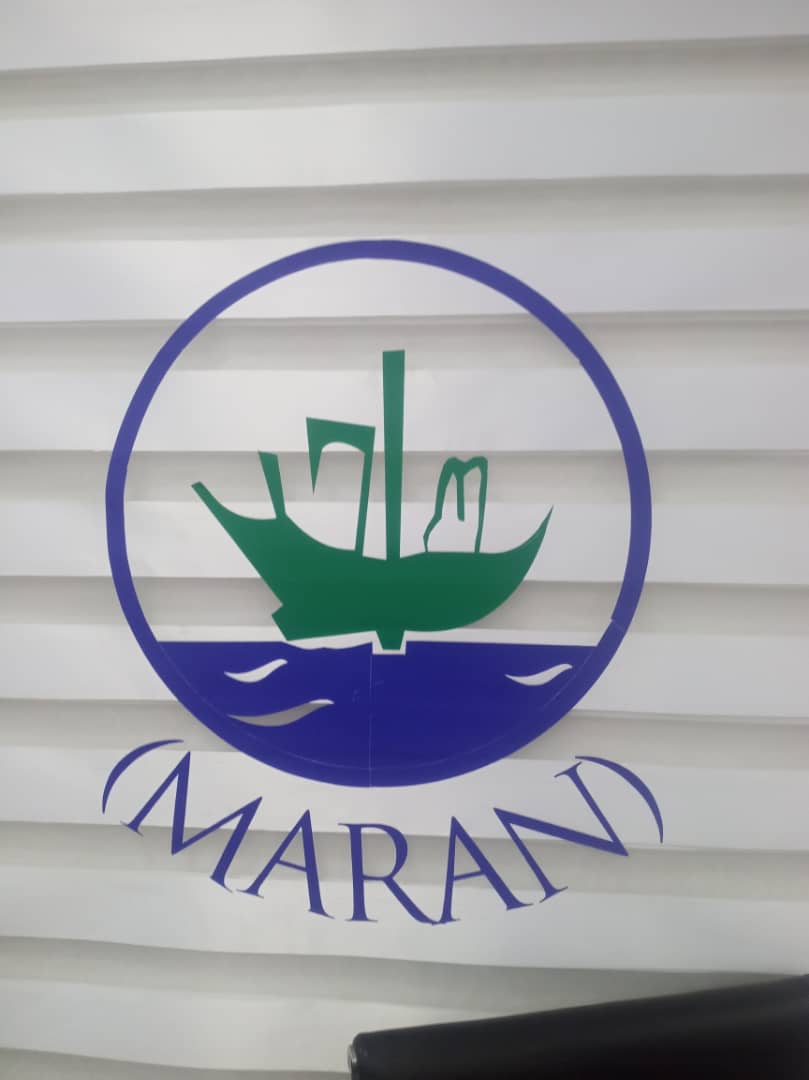
By Izuchukwu Ozoemena
Come April 15, 2025, the Maritime Reporters’ Association of Nigeria (MARAN) will play host to a top- flight event with the theme “Navigating the Nigeria-Peoples Republic Of China Currency Swap: Opportunities and Challenges for Import, Export and Maritime Business”.
The landmark event which takes place a the Rockview Hotel, Apapa GRA, Lagos, will bring together critical stakeholders in the import and export business, policy-makers, and government agencies to examine the Nigeria-China Currency Swap deal and the implications on Nigeria’s maritime industry.
The currency swap agreement, worth 15 billion Yuan ($2 billion), enables the direct exchange of the Chinese Yuan and the Nigerian naira, bypassing the US dollar.
This groundbreaking deal, according to Godfrey Bivbere, President of MARAN, is expected to foster stronger bilateral trade, between Nigeria and China by reducing transaction costs and boosting economic cooperation.
The MARAN President emphasized that in line with her role agenda-setting role, the association recognizes the importance of interrogating the policy further considering the debilitating effect of the American dollar on importation and China’s significant role as Nigeria’s biggest import partner.
Participants expected at the event include the Central Bank of Nigeria (CBN), the Nigeria-China Strategic Partnership (NCSP) and the Chinese Embassy in Nigeria.
Others are the Ministry of Finance, importers, exporters, maritime operators, policy-makers, economists, financial institutions, and trade organizations.
The event aims to provide an enhanced understanding of the Nigeria-Peoples Republic Of China currency swap and its impact on stakeholders in import, export, and maritime businesses.
The meeting will also identify potential risks and opportunities arising from China’s growing economic influence in Nigeria and provide actionable recommendations for stakeholders to navigate changes in the trade and maritime landscape.
Maritime Agencies
Zoe Maritime Breakfast Meeting: NCDMB, NIWA, LASWA Discuss Maritime Logistics, Sustainability of Ocean Economy.
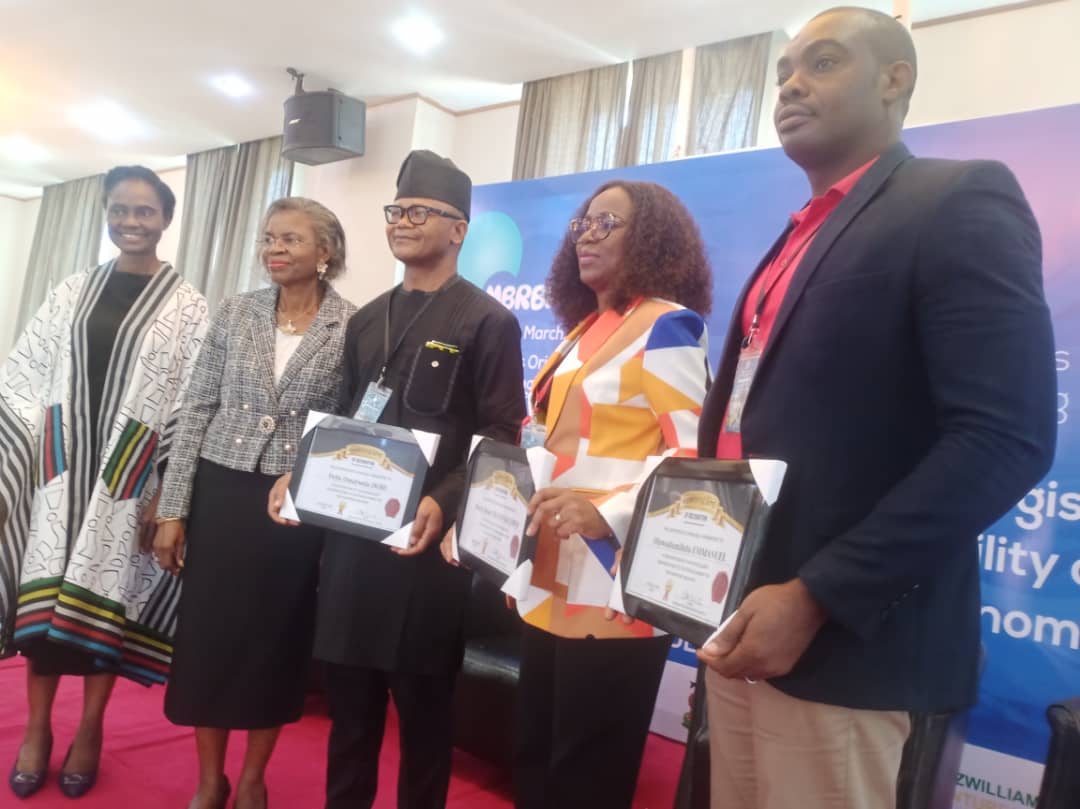
By Izuchukwu Ozoemena
In furtherance of a mandate to champion local human resources input into operations in Nigeria’s oil and gas sectors, the Nigerian Content Development and Monitoring Board (NCDMB) has instituted the Nigerian Content Forum
However, the agency’s intervention in the maritime space has been challenging as she struggles with in-country value addition and pushback in efforts to make progress.
NCDMB Executive Secretary/CEO, Mr Felix Omatsola Ogbe stated this in Lagos, Thursday, during a panel discussion at the 2025 edition of the Maritime Business Roundtable Breakfast Meeting organized by Zoe Maritime Resources Ltd with the theme ‘Maritime Logistics and Sustainability of the Ocean Economy’. Other dignitaries on the discussion included Oluwadamilola Emmanuel, General Manager, Lagos Waterways Authority (LASWA), Engr Elsie Egwuatu, Head of Marine, Lagos Area Office of the National Inland Waterways Authority (NIWA) and Ruth Ikem Chukwukezirim, CEO, Global Energy & Logistics.
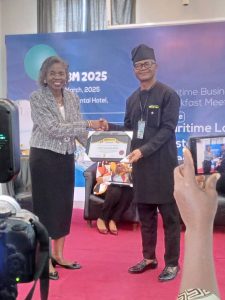
Mr Ajimijaye receiving a souvenir on behalf of NCDMB Executive Secretary/CEO.
Speaking through Silas Omomehin Ajimijaye, General Manager, Research, Statistics and Development, the NCDMB boss referred to the $350 million intervention fund up for grabs by local shipping companies. Not less than 10 Nigerian companies, he explained, have accessed the facility.
“As a matter of fact, before I came here, I was speaking with one of those companies that have benefitted from our intervention. A good example is Starzs Group. They said they are very happy with what NCDMB has done to help them as a as a company. I know the MD, Iro Ogbeifun, a lady who is doing so fantastically well. That is one of those cases we talk about women empowerment. The company is doing well. Not only them, there are several others we are working with to deepen in-country value addition in the maritime sector.”
The fund which keeps growing is disbursed as a single digit loan businesses use and pay back. “This fund is being managed by the Bank of Industry (BOI). Every now and then, they provide a report to show how it is going.”
On collaboration with other agencies, Mr Ajimijaye said part of NCDMB’s mandate is to collaborate with NIMASA to deepen local content through the Nigerian Content plan which should be enshrined into every contract arrangement.
“You have to state what Nigerian Content plan you have now and what you plan to do. Even with manning vessels, you have to show what you have currently and how you want Nigerians to understudy foreigners and possibly integrate them into the system.”
“There is what we call the baseline census for the marine services sector. What this means is that for the companies which are into marine services in the oil and gas sector, we want to do a census, a survey. What is the capacity, the capabilities? How many vessels do they have? Who are the Nigerians there? Who are the foreigners there? What are they doing and what are their challenges? When we analyse the data, we do what we call a gap analysis and have a clear data-driven scenario and recommend to government ways to bridge gaps.”
“We also recognize our partners – NIMASA, NIWA, various other institutions and industry players to collaborate to solve the problems.”
For instance, he explained, what NCDMB calls the Nigerian Content intervention fund is based on a study carried out to realize that people have financial challenges.”
The fund is given to a development bank to help NCDMB administer instead of leaving the money in the Central Bank.
On reducing joblessness among trained seafarers, the NCDMB boss explained that his agency’s intervention is a continuous process.
“For some of them, we do the training and try to source seatime places for them. It is a very big challenge to engage them on vessels for seatime experience. They have the training, certification and exposure. It’s been very fantastic but the problem is the size of the industry. Right now, you can’t take everybody. Entering the programme has always been very competitive. For those who have participated, you can rarely find anyone who has gone through that internship training roaming the streets. It’s only those who have not had the opportunity to have the exposure. The cadet internship training programme is a continuous process. Apart from cadets, we have training for marine surveyors. We give them scholarship. Thereafter, they’re expected to launch out into the world.”
NCDMB recommends that after training, the cadets are not expected to wait for the agency to engage them because it does not have the jobs.
“We are not a maritime company. We’re just to build and launch you to find work anywhere in the world.”
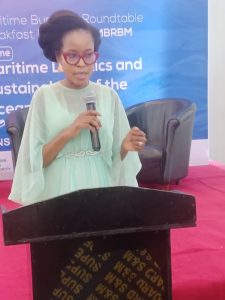
Engr Elsie Egwuatu, Head of Marine, NIWA, Lagos Office.
In a presentation, the National Inland Waterways Authority (NIWA), the statutory regulator of the inland waterways, outlined her critical role in promoting maritime logistics and the sustainability of the ocean economy by making operations on inland waterways safe and seamless. Represented by Engr Elsie Egwuatu, Head of Marine, NIWA, Lagos Office, the
agency dwelt on critical areas of concern currently including maritime accidents and safety, delays, disruptions and navigational challenges which are being tackled headlong with huge assistance from the Minister of Marine and Blue Economy, HE Adegboyega Oyetola.
NIWA, she stated, has also ensured the development of indigenous technical and managerial skills to meet the challenges of modern inland waterways transportation.
In her welcome address earlier, the Chair, Zoe Maritime Resources Ltd, Barr (Mrs) Oritsematosan Edodo-Emore said that as a coastal nation, it is important for Nigeria to harness ocean resources and develop her economy in a manner that sustains her teeming population while eradicating poverty in the land. Maritime logistics, she observed, is an acute driver of the ocean economy.
“In this digital age, it is important to evaluate how logistics is affecting the development of the ocean economy. What are our obligations in maritime logistics? What are the opportunities and how can these be harnessed to uplift the Nigerian populace and, by extension, develop the African continent?”
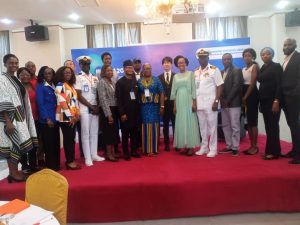
Other participants in the panel discussion included the representative of Oluwadamilola Emmanuel, General Manager, Lagos Waterways Authority (LASWA), the Nigerian Navy and Mrs Ruth Ikem Chukwukezirim, CEO, Global Energy and Logistics.
Maritime Agencies
‘OPERATION WHIRLWIND’: Customs Renews Commitment to Tackling Smuggling, Hauls Largest PMS Seizure in Kebbi.
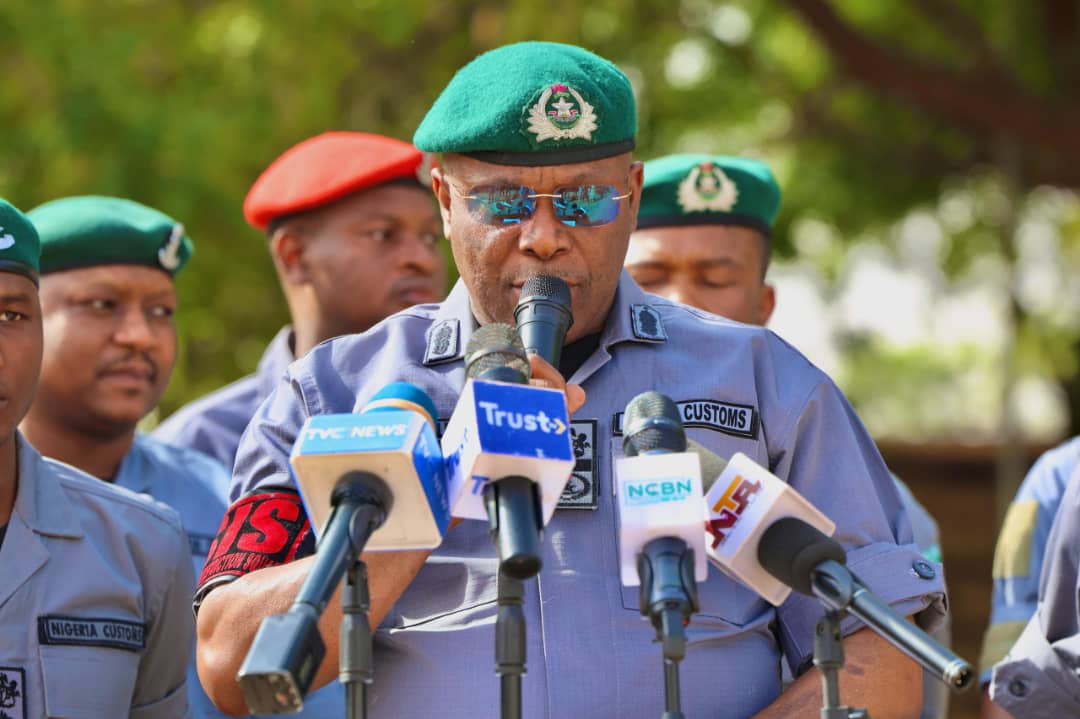
By Izuchukwu Ozoemena
Assistant Comptroller-General of Customs (ACG) Hussein Ejibunu, National Coordinator, ‘Operation Whirlwind’, a special task force of the Nigeria Customs Service on overcoming the menace of petroleum products smuggling, Tuesday, showcased what he described as the largest single seizure of smuggled Premium Motor Spirit (PMS) in Kebbi State since the operation was berthed.
Speaking at Birnin Kebbi, Kebbi State capital, Ejibunu who is also in charge of Financial Administration and Special Duties at the Customs Headquarters said the smuggling of PMS poses a serious threat to the Nigerian economy as it leads to revenue losses, distortion of trade statistics, artificial scarcity, and threats to national security.
The massive seizure, he announced, marks a significant milestone in the efforts of the Nigeria Customs Service (NCS) to protect Nigeria’s critical resources.
“The Nigeria Customs Service remains resolute in tackling smuggling activities that undermine government policies and economic stability,” ACG Ejibunu stated.
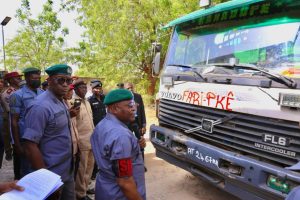
Items seized include 766 jerrycans of 25 litres each and 18 drums of 200 litres each of PMS conveyed in a Truck Plate number DC 7184 RB (Nigeria Plate Number) and 1,454 25-litre jerrycans and 18 200-litre drums of PMS loaded in a Truck number AT 2457 RUP (Republic of Benin plate.
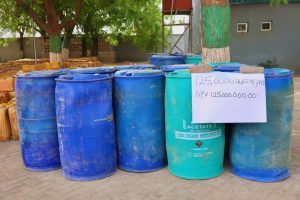
According to him, Truck number BV C240 Arubi—Republic of Benin plate number carrying 1,350 jerrycans, each 25 litres, and 18 drums, each 200 litres of PMS was also confiscated.
Additionally, 805 kegs of 25 litres of PMS seized at various flashpoints in the zone including Dole Kaina, Zaria Kalakala, Tunga Waterside, Lolo, and Tsamiya were also displayed.
The interception, which resulted from credible intelligence, occurred in the Tsamiya area of Kebbi State following days of painstaking surveillance.
Ejibunu who restated the determination of the NCS to sustain the fight against fuel smuggling said the Service is ever prepared to strengthen inter-agency collaboration so as to secure Nigeria’s borders.
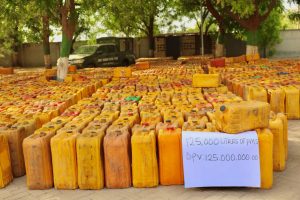
Kegs of confiscated PMS.
The seized PMS was sold at a controlled price of N10,000 per 25-litre jerrican to ensure that citizens rather than the smugglers themselves benefit.

Chidi Nwokorie, CAC, Kebbi Command.
Addressing the press, Comptroller Chidi Nwokorie, the Customs Area Controller (CAC), Kebbi Command, reiterated his commitment to combat smuggling and other illicit trade activities in Kebbi State. He assured stakeholders of the Command’s determination to enforce trade regulations.
“We remain committed to facilitating trade and ensuring a seamless business environment for legitimate traders. For smugglers, our operations will only intensify to bring smuggling to its lowest possible level,” he pledged.
While recognizing how effective intelligence-driven operations can be, CAC Nwokorie commended the efforts of Customs officers in executing successful enforcement operations.
He also acknowledged the collaboration with sister agencies, highlighting their critical role in ongoing anti-smuggling initiatives.
“This success is a testament to the dedication and synergy between Customs and other security agencies. We will continue to work together to protect the nation’s economy,” Nwokorie added.
On his way back from Kebbi, ACG Ejibunu visited the Sokoto Customs Area Command, where he met with the Customs Area Controller, Sokoto-Zamfara Command, Comptroller Umar Abdulkadir and officers and men of the Service.
He used the opportunity to reaffirm the commitment of the Service to border security and the fight against smuggling.
-

 Maritime Agencies2 weeks ago
Maritime Agencies2 weeks agoLilypond Export Command Is Meeting Expectations, Handles 70% of Nigeria’s Total Tonnage of Export Cargo, says CAC Odusanya.
-

 Personality Interviews3 weeks ago
Personality Interviews3 weeks agoTRADE FACILITATION: FULFIL CUSTOMS REQUIREMENTS, ENJOY AEO, B’ODOGWU, says Ayokunle.
-
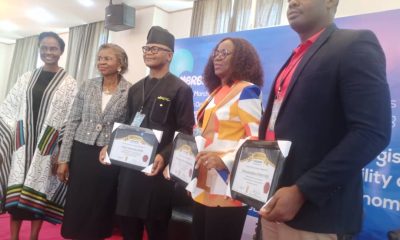
 Maritime Agencies4 days ago
Maritime Agencies4 days agoZoe Maritime Breakfast Meeting: NCDMB, NIWA, LASWA Discuss Maritime Logistics, Sustainability of Ocean Economy.
-

 Maritime Agencies3 weeks ago
Maritime Agencies3 weeks agoSEME CUSTOMS: Dr Oramalugo Dares Smugglers, Seizes N267m Illicit Drugs, PMS, Rice In A Month
-

 Maritime Agencies1 week ago
Maritime Agencies1 week agoANTI-SMUGGLING: Kebbi Customs Generates N13.3M In A Month, Confiscates Contrabands Worth N84.2 M.
-
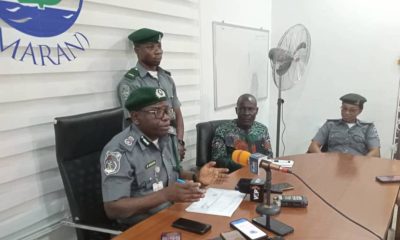
 Maritime Agencies3 weeks ago
Maritime Agencies3 weeks agoCustoms Export Command Seeks Seamless Movement To Ports To Evacuate Export Containers
-
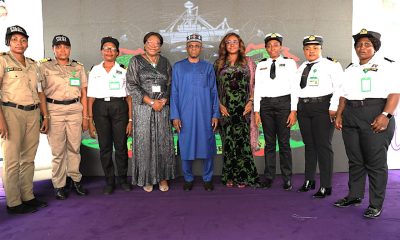
 Maritime Agencies3 weeks ago
Maritime Agencies3 weeks agoINTERNATIONAL WOMEN’S DAY, 2025: NPA Pledges Equal Rights For Women In the Workplace.
-

 Maritime Agencies1 week ago
Maritime Agencies1 week agoPorts Commissioner of Police Commends Bivbere-led MARAN for Responsible Reportage of Maritime Sector




